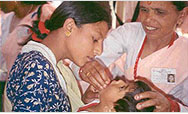Youth Profiles: Rakeb - Addis Ababa, Ethiopia
“I now feel much closer to Ethiopia. A lot of people think that once you come to the United States you stop caring. There is so much work to be done in Ethiopia, such as health and education. I definitely want to go back and work on such issues. I can use so much of what I’ve learned here in the U.S. and take back home. I can use my computer skills to teach high-school kids, and as a woman, talk to other Ethiopian women about their health and other issues. ”
21 year-old Rakeb is currently a student at George Washington University in Washington, DC working towards her MBA. She first came to the United States to finish her last two years of high school, then went on to attend LaRochelle College in Pittsburg where she earned a B.A. in Information Systems, Business Information and a minor in Accounting. She has lived in the U.S. for six years now and plans to remain and work here for a while before returning to Ethiopia.
Rakeb grew up in Addis Ababa, the capital of Ethiopia. Her father, a Veterinarian, now owns his own business in Ethiopia and her mother works for the government. Growing up, Rakeb went to a private school in Addis Ababa that was based on the British school system. She remembers waking up early in the morning and waiting for her parents to drop both her and her brother at school. They stayed at school late, until about 4:30pm, before returning home and continuing to study with a tutor or taking piano classes. This schedule didn’t leave much personal time and after having dinner with her family, she did some homework and then went to bed. Some of her meals sounded quite exciting, such as Injera., sponge bread with various vegetables and meet stews, Shero, ground chickpea paste or even Kifto, chopped beef with butter and spices.
Thinking back, Rakeb remembers a big gap between the rich and the poor in Ethiopia. “Lower income houses and slum areas can often be found adjacent to higher income homes.” As a child, she was aware of some of the issues troubling her country, such as HIV/AIDS and poverty, but it took age and experience for her to become active in combating them. She remembers that death from HIV/AIDS was often blamed on tuberculosis or other diseases. When a close family friend died from HIV/AIDS she realized that something had to be done to eliminate the stigma associated with the disease. “Through my education, work and experience I have been able to acquire a broad view of the world and its multiple problems and am very thankful for that.”
Based on her experience, Rakeb first intended to go to medical school and return to Ethiopia to make a difference, especially in the fight against HIV/AIDS. During college, she participated in a program called “peace-builders,” which involved teaching American high school students about developing countries. That experience taught her a lot and until today she has been working with a number of organizations, such as YouthNet and the World Bank both of which address issues concerning HIV/AIDS. She also began a project in college called “Panel of Life” working with high school students and coordinating fundraising activities for U.S. doctors for Africa.
Since moving to the U.S., Rakeb has not had a chance to go home to Ethiopia but she continues to observe numerous new developments. “The media has been very active in educating people, especially youth and people in rural areas. Individuals with or affected by HIV/AIDS have also been telling their stories via the various media outlets. You can also find posters with HIV/AIDS messages all over the country.”
Rakeb firmly believes that her family values and traditions have helped her form the crucial foundation needed for all her endeavors and work. She intends to remain active in her support for Ethiopian and foreign development organizations and use her educational experience to help facilitate their growth.
|


